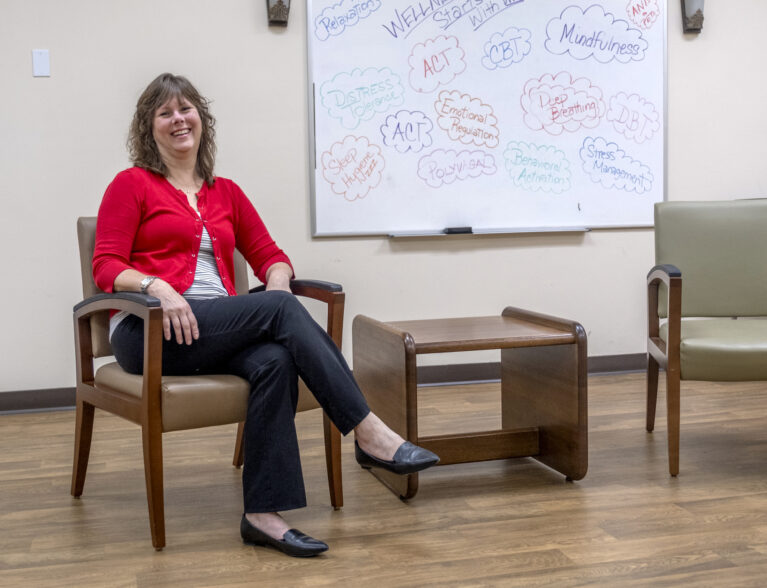
A new Harvard-led study builds on earlier research suggesting forgiveness boosts our mental wellbeing by reducing anxiety and depression, which adds to other recent evidence that it can also ease stress, improve sleep, and lower blood pressure and heart rate.
But forgiving is easier said than done, isn’t it?
“It is,” says DeAnn Collins, licensed clinical social worker and behavioral services clinical manager at Health First’s Behavioral Wellness. “I’ve learned that generally it’s an intentional decision to let go of hurt about an offense someone committed. People can learn how to forgive, but sometimes professional help is needed if they can’t do it on their own.”
The definition of forgiveness is surprisingly basic. It’s simply replacing ill will toward an offender with goodwill. What forgiveness doesn’t mean is a bit more nuanced: It doesn’t condone the harm you’ve suffered and it definitely doesn’t mean you’re expected to forget it.
It’s not excusing, explaining or exonerating, necessarily, but rather accepting that what happened is over and recognizing that resentment toward another hurts us more than them.
Studies have found that some people are just naturally more forgiving than others.
Consequently, they tend to be more satisfied with their lives and to have less depression, anxiety, stress and anger. People who hang on to grudges, however, are more likely to experience severe depression and PTSD, as well as other health conditions. Some 62 percent of American adults say they need more forgiveness in their personal lives, according to a survey by the nonprofit Fetzer Institute.
Collins says many people have their first experience holding a grudge during childhood. It’s a natural response and a defense mechanism because they don’t want to be hurt again.
Nationally known psychologist Dr. Eileen Kennedy-Moore discussed how parents can teach children about forgiveness in a Psychology Today article. She wrote, “Children watch how important adults in their lives respond when someone does something unkind. Do they let it go or hold a grudge? Do they complain to others or speak directly to the person involved?
How long does it take them to get over being mad or hurt? How do they get over it?
“Sometimes parents instruct children directly about how to respond to hurts caused by friends. Depending on the situation and the family values, parents may promote responses that range from ‘Don’t let him walk all over you!’ to ‘He didn’t mean it’ or ‘Everyone makes mistakes.’ There’s a delicate balance that children need to strike when it comes to forgiveness.”
Exactly what happens to your overall health when you learn how to forgive? Well, according to Johns Hopkins University, the good news is that studies have found that the act of forgiveness can reap huge rewards for your health. And research points to an increase in the forgiveness/health connection as you age.
“There is an enormous physical burden to being hurt and disappointed,” says Karen Swartz, M.D., director of the Mood Disorders Adult Consultation Clinic at the Johns Hopkins Hospital. Chronic anger puts you into a fight-or-flight mode, which results in numerous changes in heart rate, blood pressure and immune response. Those changes, then, increase the risk of depression, heart disease and diabetes, among other conditions. Forgiveness, however, calms stress levels, leading to improved health.
Collins says we give other people a large amount of power over us when we refuse to forgive them. She cites people who were able to turn terrible adversity into a positive situation – like the moms who founded Mothers Against Drunk Driving. “Sometimes we carry a lot of emotional baggage from a situation that was dealt to us,” she says, but forgiveness and positive action can bring healing.
How can you move toward a state of forgiveness? Mayo Clinic’s newsletter says that forgiveness is a commitment to change. It takes practice. You might try the following to help you get started:
- Recognize the value of forgiveness and how it can improve your life.
- Identify what needs healing and who you want to forgive.
- Join a support group or see a counselor.
- Acknowledge your emotions about the harm done to you, recognize how those emotions affect your behavior, and work to release them.
- Choose to forgive the person who has offended you.
- Release the control and power that the offending person and situation have had in your life.
One mistake people often make is forgiving someone and expecting them to change as a result. “If you do that, you’re setting yourself up to be hurt again,” says Collins. “We have no control over someone else’s actions or behavior.”
Has social media made it harder to forgive? According is Martha Minow, a Harvard Law professor, the answer is yes. “Forgiveness often requires proximity,” she says. The lack of eye contact in digital media, along with the disinhibition effect, makes it easier to choose rage over forgiving.
“It takes time and patience to forgive someone,” she adds. “You have to actually listen and hear the apology and decide if it’s trustworthy. You can’t do that online.”
DeAnn Collins is a licensed clinical social worker and behavioral services clinical manager at Health First’s Behavioral Wellness where she oversees intensive outpatient programs and assesses new patients. She has specialized in senior mental health needs and treatments. Her office is located at 3661 South Babcock, Melbourne. Call 321-434-7604 or visit HF.org/BehavioralWellness.



